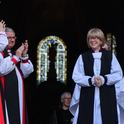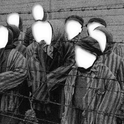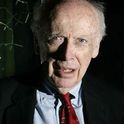“All the angels pray. Every creature prays. Cattle and wild beasts pray and bend the knee. As they come from their barns and caves they look up to heaven and call out, lifting up their spirit in their own fashion… What more need be said on the duty of prayer? Even the Lord himself prayed.”
That’s Tertullian, the Carthaginian theologian, writing in the 3rd century CE. Not a saint, but a great man of faith. And here I am: the person who prays in this place, for these people. I’m not the only one, thank God. There are people praying all around in the privacy of their homes. However, I’m the one who’s ordered and obligated to pray for the villages and the people here, and to lead them in prayer in the churches. People stop me on the street and ask for prayers for themselves or people they love.
I’m infinitely grateful to have the obligation because otherwise, frankly, I wouldn’t consider myself remotely suitable for the job. There are deeply spiritual people all around, but I’m not one of them. I’m easily distracted, and tethered with a thousand Liliputian guy-ropes to the earth. I’ve been praying all my life and still pray as I did when I was a child. A friend identifies as “deeply spiritual”, and says she spends hours in silent adoration. I can’t help thinking of the deli scene in When Harry Met Sally.
I kick that thought aside and go on praying. Every morning, it’s the words of the Office that wake me up before the coffee: “The night is past and the day lies open before us: let us pray with one heart and mind.” Then the rubric: Silence is kept. The silence is part of the prayer; it’s a moment—as long a moment as can be tolerated—of listening, before we then turn to giving thanks for the gift of a new day and open the book to that morning’s appointed psalm.
After the set parts of the service, there are the Post-it notes: prayers for the schools, the hospital, the care home and for each and every person who has asked for our prayers, along with those who have no one to pray for them. And those whose circumstances we can’t get out of our minds, such as Jason Thomas-Fournillier, who wrote a moving column in the April issue of Prospect about the rejection of his asylum appeal. We’ll pray for the nation, the world and the Church. My former curate, Father Miles, never hesitated to ask the Lord to confound the schemes of the wicked, and now I do too. I say “we” because there’s often someone with me when I pray the morning Office, but also because these prayers are joined, we believe, by the whole Church in time and in eternity.
The psalms are the prayers of the Church and of Jesus, as well as making up a large part of the Jewish services I grew up with. Just about everything you might be feeling can be found in the psalms, which gives you permission, if you need it, not to airbrush your devotions. “Why are you so full of heaviness, O my soul, and why are you so disquieted within me?” Right now it’s because Anna, the vicar of St Bene’t’s in Cambridge has died suddenly at 44. The day after her death, I went into town for the midday mass at her church. Lots of other people had the same idea: all the extra chairs were deployed. It was what’s called a said service—that is, a fully spoken service—which was good. Nobody was up to singing, apart from a baby at the back.
After communion, after the blessing, came the dismissal, but nobody moved. And I felt something like a high-pressure system of love and grief moving outwards, carrying the common prayer of a hundred or so people towards the world and towards God. Tertullian says of such moments: “No longer does prayer bring an angel of comfort to the heart of a fiery furnace, or close up the mouths of lions, or transport to the hungry food from the fields. No longer does it remove all sense of pain by the grace it wins for others. But it gives the armour of patience to those who suffer, who feel pain, who are distressed. It strengthens the power of grace, so that faith may know what it is suffering for the name of God.”
Wittgenstein, whose religious views were as profound and as odd as Tertullian’s, scribbled in his notebook while on the eastern front: “What do I know about God and the purpose of life?… To pray is to think about the meaning of life.”
Correction: In the print edition of this article Father Miles was mistakenly referred to as Friar Miles.














